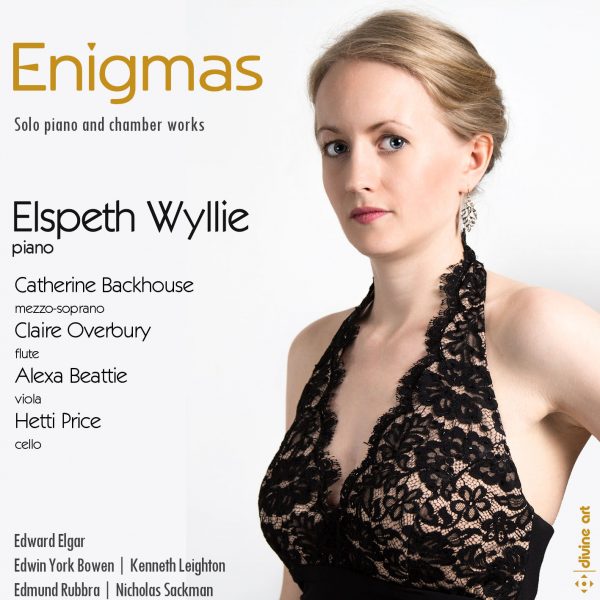Klassik.com
Interpretation 4/5 Sound quality 4/5 Repertoire 4/5 Booklet 3/5
A debut CD like a kitchen party – a Scottish pianist invites her friends, and they all bring something different. Not everything is equally well done, but much is excellent.
Straight away the CD title “Enigmas” suggests an element of mystery. The solo piano version of The Enigma Variations, played by Wyllie, is the obvious candidate, this version is by the cpmoser himself, not otherwise a prolific writer for the piano. It is not the biographical personal and character traits suggested by the music, but the unfamiliar sound of the piece on the piano, which is the problem to be solved. The pianist, trained in Edinburgh, Oxford and at the Royal Academy of Music, has not always a satisfactory solution; the well defined piano sound allows her a finely balanced sound which does convey something of the colourful orchestral sound – in tempo terms after a leisurely beginning it develops an inner tension and drama, so that even against the orchestral diversity of sound, the rather brittle piano version is very good to listen to and enjoy.
Wyllie has a flair for sound colours and tempi, with a secure technical and artistic touch, except in the last variation, the finale; why this is reduced to a crawl and loses all tension is the biggest mystery of the CD. Garzón in 5:49 and Wass in 6:05 provide the technical and tonal heights with some safety margin, but a brake on tempo to 7 minutes and 19 seconds is aesthetically unjustifiable and dilutes the otherwise excellent impression that Wyllie gives on her debut CD. In ‘Nimrod’, Wyllie’s deliberate slowness is within the range of elegiac expression but the finale dies at a snail’s pace. Otherwise this artist’s visiting card Cd published by British-American label Divine Art is recommended.
Like the vast majority of the Enigma Variations, the short character pieces by Nicholas Sackman, born in 1950) are pictorially quite obvious, the second soloist joins the main artist in these humorous sketches. Including ‘Jumping Jack’ and ‘Rum Baba’, these are not avant-garde but well constructed ‘petits fours’ for salon concerts and teaching. The booklet does not contain the date of composition.
York Bowen’s Flute Sonata of 1946 belongs in the same field of British conversation music, here with a clear influence from French neighbours, notable Francis Poulenc. With the flautist Claire Overbury, a harmonious, atmospheric performance has been achieved. Kenneth Leighton’s rather gloomy Elegy, Op. 5, from 1953, is played equally effectively by cellist Hetti Price in a dynamically and expressively well balanced interpretation. Leighton’s Elegy and Bowen’s Flute Sonata are recommended!
Although the piano sound is not quite as transparent in the duo pieces as in the solo works, the flute and cello come through speakers or headphones with powerful force. Edmund Rubbra’s late ‘Alabaster Sonnets’, on the other hand, suffer a little from the imperfect intonation of soprano Catherine Backhouse, which is juxtaposed against Elspeth Wyllie’s piano and Alexa Beattie’s viola.
Not everything worked perfectly at this puzzle party with British offerings; on the whole it is very good, expect Elgar’s final variation and Backhouse on the final tracks; however given the somewhat exotic touch of the programme it is advisable to give these interesting tidbits a bite.
@divineartrecordingsgroup
A First Inversion Company
Registered Office:
176-178 Pontefract Road, Cudworth, Barnsley S72 8BE
+44 1226 596703
Fort Worth, TX 76110
+1.682.233.4978












